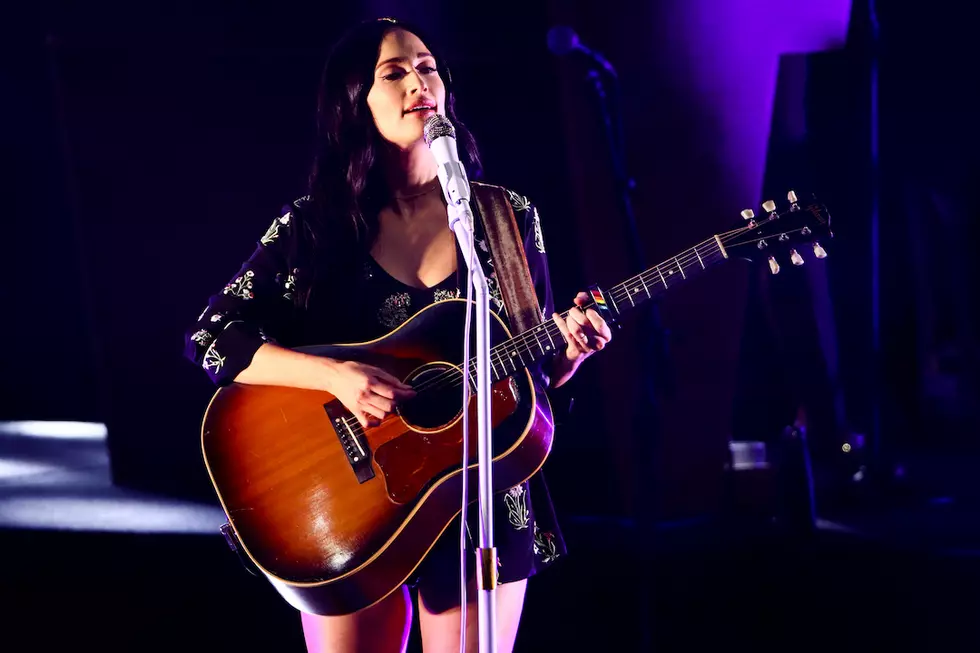Interview: Jade Bird Talks ‘Musical Crowds’, Writing on the Road + Loving Tori Amos
Jade Bird has had a banner 2019, starting with the April release of her self-titled effort. Recorded with Simone Felice in the Catskill Mountains, the full-length project is a diverse debut that encompasses stripped-down folk, propulsive alt-country, bluesy rock and all points in between.
Bird is naturally gratified by the ways "people have responded and found something in the record," she tells The Boot. "What's always surprising to me is how people have different favorite tracks. Some people, it's "17;" a lot of people, it's "Side Effects." I never really knew they were going to gravitate to different ones."
As Bird prepared to launch a headlining tour on Saturday (Sept. 7), she chatted about recording Jade Bird, staying creative while on the road and where she sees her music going next.
You spent a few weeks out on the road earlier this year opening for the folk-rock act Hozier. How did the fans respond?
Honestly, it was one of the best support tours I've ever done in my life. He's the nicest guy in music — so humble, just so sweet and supportive of me and my music. Secondly, the crowds — I've never had anything like that. They were standing up after I played in a lot of cities. To be honest, it gave me the biggest confidence boost in my music and me as a solo performer first. It was the most incredible experience.
That's good, because being an opening band, as I'm sure you know, can be so dodgy. People are either like "Oh, that's great," or else they just want you to get off the stage.
Luckily, in America, for some reason, we seem to go down ... I think people just appreciate the honesty of the music. We're not really putting on airs and graces. In America, touch wood, all the supports have been really, really great.
Don't get me wrong, we've had some support slots that have been like, "Oh God." [Laughs.] I think the audience forgets how much of a part of this whole experience they are. If they're with you, it can be the best gigs of your life, and if they're not, you can't get off the stage quick enough.
It's so hard when you have a bad gig. You're like, "Okay, how can I recover from that?"
It's just your morale. I make sure that everyone on the team and in my band really love music. They live for music, and it's our whole life, and we choose it to be so. When you play in front of an audience, you want to share that. You want to share that equal joy and passion for music. A music crowd is our crowd.
"When you play in front of an audience, you want to share ... that equal joy and passion for music. A music crowd is our crowd."
Have you found any major differences between U.S. and U.K. audiences?
[The U.S. seems] to have no qualms about shouting or clapping. They just seem to be a bit more free with us and, therefore, give us that freedom to be who we are. In the U.K., as much as I love it — maybe it's my music, I'm not sure — it's just a little bit more reserved. I'm really looking forward to the fall, because I'm hoping that on our second headline [tour], people will really start to get it and understand us.
You worked with Simone Felice on Jade Bird. What made you such great collaborators?
We're both very honest people. We're not trying to put any walls up between us. We want to give the song the best dressing it can have. So we just trace it, instrument by instrument, and try and create the best track we can make out of the songs that I've written first. I always start on the piano or acoustic. Simone is like me, a little bit eccentric, very honest character and really cares and has a passion for music. That's why we're like family now.
You recorded the album in a barn outside of New York City. How did that contribute to the sound of the album?
There's some magic up there. I think it was more the access to the musicians we had. So, we had Zack Alford on drums and [percussionist] Matt Johnson and Simone and [keyboardist] David Baron. All these people who were local to that area, I managed to get on the record, for that reason, and I think that just brought it a whole new life than it ever would have had anywhere else. I'm so happy I did that record up there.
It's nice being in a place like that too, because you're almost sort of removed, too. You can really focus on the music, because it is a little bit out of the way.
Yeah, it totally changed my perspective on things. I was very clouded and everything felt very foggy, and I was a little bit anxious before I went up there. It really seemed to space everything out. And the vastness of the American landscape, in your head, just lets you breathe, in a strange way. It's hard to explain, but it helped me a lot.
"I feel like I'm a songwriter first, and that means maneuvering through genres ... I'm very young, and I need to explore and develop that."
How do you see that translating to the songs you were singing, and then to the music itself?
I never really put nature into my record, but I think environment is important, and I think environment has an effect on your person. So if you're in the studio with people who let you be whatever you want to be, let you write whatever you want to write and record whatever you want to record, naturally you'll feel more comfortable and be able to get a better performance out of yourself. I'm really proud of the vocal performances on the album. They pushed me so far to get the voice I have now. It didn't just necessarily happen overnight that I got a bit gravelly. [Laughs.] It's confidence, I think.
You're such a prolific writer. Have you found yourself writing on the road as you've been traveling more?
You do have to kind of sit down and try to write, because it's not the easiest thing when you're off and on planes. I'm sure if you're always on a bus, it's a little bit easier. But I've had to force myself a little bit to write, but I'm so excited because I've got so much music to get out.
I'm just thinking about the vision for how I want my music to go and what I want it to say. I'm always creating in a way, even if it's just thinking about it. But I do have to sit down and try and really write. Traveling, it doesn't lend itself to being easy.
What's the origin of the song "Side Effects"? How have you seen the song evolve over time?
I wrote it in a hotel, and I was in L.A., but not in the way people usually say, "I'm writing in L.A." We were in this dingy hotel, and I felt a bit claustrophobic. We'd been in a lot of hotels up to that point, doing promo and stuff like that. And so my partner went out for a walk, and I sat on the hotel bed, and I wrote about when you fall in love with someone, the side effect of that is wanting to get away and not be trapped and travel with that person.
And in the studio, I think it's really set my mind alight in terms of this driving power. It's a little bit War on Drugs, little bit early Fleetwood Mac. The way the bass and the drums lock in is quite a simple and musical format. "Side Effects," for me, is the beginning of something new in that respect.
I've just written one that I feel is the carry on from it, called "Honeymoon," and I think that'll see the light of day soon. A lot of songs can be the start of more songs, in a strange way. They're parents of other songs.
The record is so diverse, too. You could go in so many different directions going forward.
Exactly, yeah. I wanted to leave every door open, in a way. I didn't want to close myself in to being either Americana or blues or pop. 'Cause that's not me. I feel like I'm a songwriter first, and that means maneuvering through genres. I'm 21. I'm very young, and I need to explore and develop that. And all the artists I admire, like Beck or Tori Amos or Patti Smith, they went wherever [inspiration] took them. I definitely feel like I'd be suitable for the same lane, in that respect.
I'm a big Tori Amos fan too, and when you look at her career and where she started and then where she's gone, she's explored so many different musical outlets, detours and sounds. She's definitely one that's really done something incredible, because the songs matter. The bones of the songs are there.
I'm absolutely obsessed with Tori Amos at the moment. I just think she's a classic artist. When I found her I was like, "Oh my goodness. She's a genius." I think when you discover acts like her, you realize that it's not about being a genre, it's something entirely different.
Tori Amos always talks about whatever the muse is telling her at a specific time, that's where she goes. And that's served her well. That's such an instructive way of looking at creativity too.
You want to try and get whatever you say and your voice as clear as possible. You do that by continuing on the road. At the start I did the EP, Something American, and I was very much a product of my influences. And then, slowly, I started to write, like, "Lottery" and "If I Die" and "Side Effects," which is really just coming from the horse's mouth, you know? It's coming from me and my head, and my brain, not because I'm trying to, indirectly or directly, sound like anything else.
Who Is Jade Bird? 5 Things You Need to Know
More From Big Cat - WBKT-FM




![Chris Knight, ‘Almost Daylight’ [Exclusive Premiere]](http://townsquare.media/site/623/files/2019/09/chrisknight_raykennedy.jpg?w=980&q=75)





